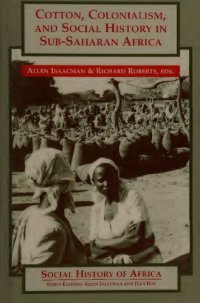
Ebook: Cotton, Colonialism, and Social History in Sub-Saharan Africa
Author: Allen Isaacman, Richard Roberts
- Series: Social History of Africa
- Year: 1995
- Publisher: Heinemann / James Currey
- City: Portsmouth, New Hampshire / London
- Edition: paperback
- Language: English
- pdf
This interdisciplinary collection brings together scholarship on the social history of agrarian change in Africa. It provides an important entry into the lived experiences of millions of Africans who cultivated cotton, often under duress, during the colonial period. The social history of cotton in Africa thus provides an opportunity to take a constant in the changing worlds of colonialism-cotton-and to explore the range of African experiences historically and geographically. By linking cotton and colonialism in this way, these eleven case studies open up new comparisons between different colonial agricultural policies, different labor regimes, and different forms of African response to colonial economic policies. This collection highlights both the way industrial capitalism sought to call forth tropical raw materials and the ways this colonial project was shaped by the dynamic local processes of production, exchange, social reproduction, and rural resistance.
Africans experienced cotton colonialism through the interior architecture of the societies in which they lived. But these very societies were undergoing rapid change as wives and husbands, fathers and sons responded to the opportunities and constraints associated with colonial conquest. These chapters explore the ways in which cotton production and marketing affected gender relations, food security, and the environment, intensifying contemporary struggles over custom, meaning, power, and property. The intensity of these contests is critical to understanding the social dynamics of the cotton revolution in the twentieth century.
Africans experienced cotton colonialism through the interior architecture of the societies in which they lived. But these very societies were undergoing rapid change as wives and husbands, fathers and sons responded to the opportunities and constraints associated with colonial conquest. These chapters explore the ways in which cotton production and marketing affected gender relations, food security, and the environment, intensifying contemporary struggles over custom, meaning, power, and property. The intensity of these contests is critical to understanding the social dynamics of the cotton revolution in the twentieth century.
Download the book Cotton, Colonialism, and Social History in Sub-Saharan Africa for free or read online
Continue reading on any device:

Last viewed books
Related books
{related-news}
Comments (0)